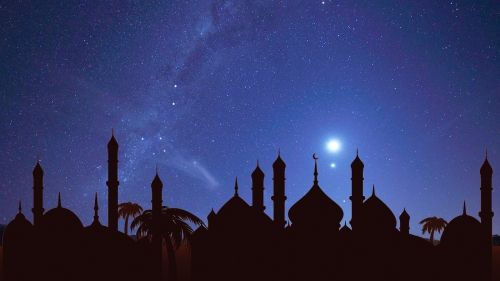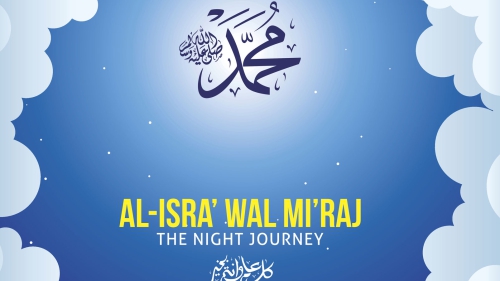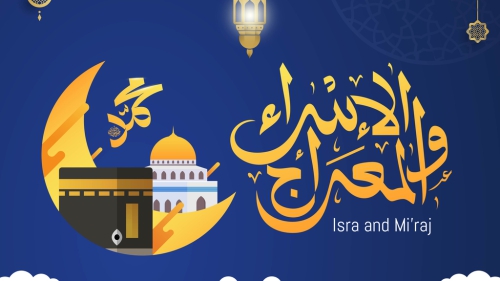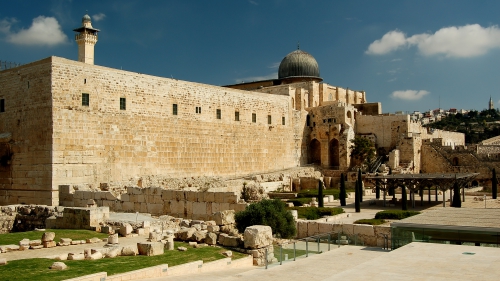Isra Miraj: Inspiration From The Celestial Night Journey
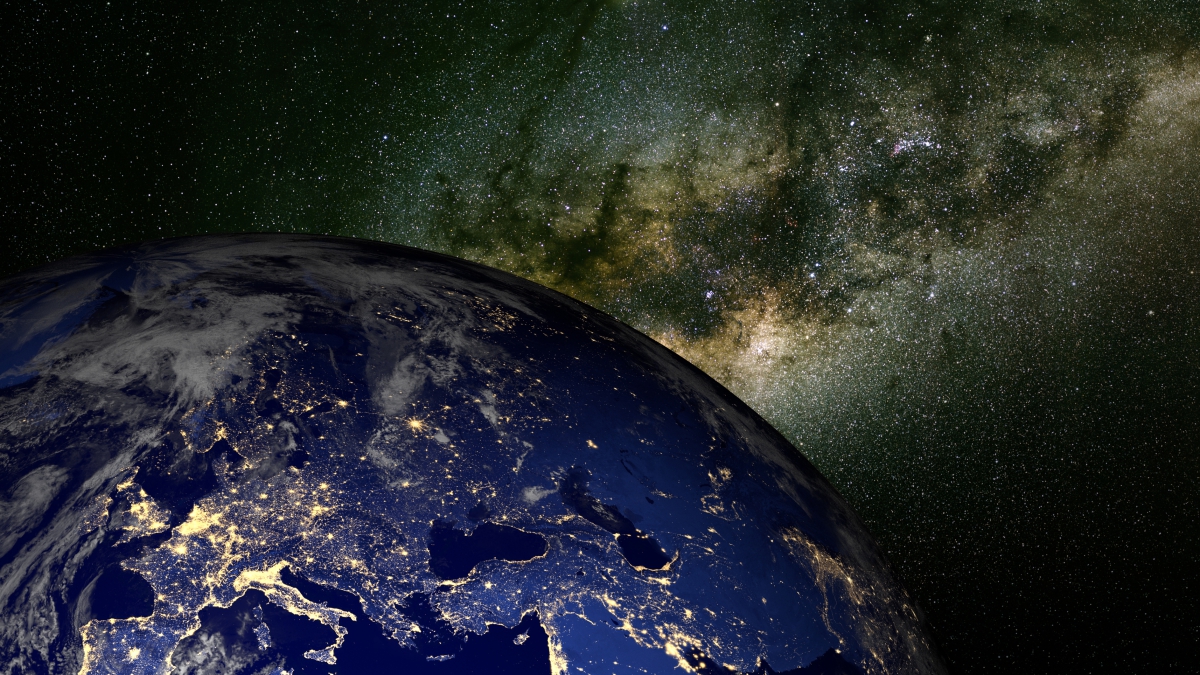
There are two nights that we commemorate in the life of the Prophet; two nights of such significance that they are distinctly mentioned by name in the holy Qur'an ...
- Laylatul Qadr which commemorates an event that occurred when he was forty years of age; the Night of Power and Empowerment. It marked the commencement of the final Divine Revelation (the Qur'an) and made public the prophetic mission of the final emissary of Allah (Prophet Muhammad). This event is of the great historic, religious and spiritual significance as it changed the fate of nations and the course of history It marked completion of the mission of Prophets, and ushered in the end of divine revelation.
- Laylatul Isra' wal Mi'raj; the Night Journey and Ascension which commemorates and event that occurred when the Prophet was 52 years of age.
Period of Sorrow
The Isra' wal Mi'raj occurred at a most trying time of Prophet's challenging life. The people of Makkah; who had called him as-Sadiq /truthful and al-Amin/trustworthy, had rejected his message; ostracized his followers and victimized his family. He and a handful of followers endured three years of relentless persecution and boycott from the Makkans and he eventually went to Taif to preach his message. There they mocked him and stoned him till bled profusely. He turned to Allah with the words; "Oh, Allah, I appeal to you for the weakness in my strength, the limitation of my power, and the treatment of disrespect and humiliation from people. To you, the Most Merciful of all the merciful ones I turn for You are the Lord of the oppressed, and you are my Lord ... "
Then at this most difficult and trying time of the holy Prophet's illustrious life, he experiences the 'am al-huzn (year of sorrow) in which he witnessed the passing of two significant people in his life. One was his protective uncle Abu Talib, who was his guardian and political protector and the other was Khadijah, his most beloved wife, his confidante, mother of all his children (except Ibrahim). She was the first to embrace his faith, the financier of the nascent Islamic movement and Mother of the Faithful. It was at this time that the Isra' wal Mi'raj (Night Journey and Ascension) took place; from Masjid al-Haram in Makkah to Masjid al-Aqsa in Jerusalem
Isra
Al-Aqsa in Jerusalem The significance of Jerusalem and al-Aqsa is evidenced through reference to Masjid-ul-Aqsa and its precincts in the holy Qur'an [Q 21:71; Q 17:1] and numerous sayings of the Prophet (pbuh). This is the area of the world where Prophet Dawud (David), Sulayman (Solomon) and 'Isa (Jesus) were born, grew up and carried out their missions; the place to which Prophets Ibrahim (Abraham) and Lut (Lot) migrated; where Yahya (John) preached and where Ibrahim (Abraham), Ishaq (Isaac), Ya'qub (Jacob), Yusuf (Joseph) and Musa (Moses) are buried. May Allah be pleased with all of them.
Al-Aqsa preceded Makkah as the first direction of prayer for the early Muslims and Jerusalem is spiritually linked with Makkah when Masjid-ul-Aqsa became the destination of the Isra' in the Night Journey [Q 17:1] of the Prophet Muhammad. The Prophet Muhammad is reported to have exhorted Believers ... "Do not strain to undertake journeys except to visit three mosques, Masjid- ul-Haram (in Makkah), Masjid ul-Nabawi (in Madinah) and Masjid-ul-Aqsa (in Jerusalem)". [Sahih Bukhari] Muslims refer to Jerusalem as Bayt-al-Maqdis/the Sacred Place, a fact we should never forget.
Mi'raj
After al-Aqsa in Jerusalem, the journey went far beyond the parameters of human travel. The Prophet was accepted to the celestial regions where he witnessed remarkable signs of divine majesty about which the Qur'an says; "The eye was not diverted nor did it deviate; he indeed saw the greatest signs of his Lord." [Q: 53:17-18]
Imam al-Busayri writes in the Qasidah Burdah:
Sarayta min haramin laylan ila haramin
kama saral badru fi dajin min az-zulami
Wa bitta tarqa ila an nilta manzilatan
min qabi qawsayni lam tudrak wa lam turami
You travelled by night from one sacred Masjid to another
like the full moon that travels through darkness
And you completed the ascent until you reached the position
(of nearness of a distance) of only two bow lengths
(such nearness) that has never been achieved nor ever been sought.
Isra' wal Miraj was a total all-comprehensive voyage ; from'alamul mulk wash shahadah horizontal journey across a visible phenomenal world to 'alam al-malakut, vertical cosmic pathways (tariqah) traversing all spiritual realms to haqiqah /Divine Reality. A journey that was terrestrial and celestial, earthly and heavenly, physical and metaphysical, corporeal and spiritual, esoteric and exoteric, microcosmic and macrocosmic, within a night yet beyond normal time and space. It was a journey from creation to Creator, from orientation to the Divine House (Ka'bah) to an audience with the Divine (ie. from Ka'bah to the Lord of the Ka'bah), from the limitedness of being to the limitlessness of the Absolute; witnessing the ayat/divine signs and symbols to (ayatin-al kubra) ultimately witnessing the One who is symbolized. It was indeed a journey that reached far beyond the parameters of human travel, beyond the Gabriel who accompanied the Prophet on the journey, reached a point beyond which he could not traverse. Prophet Muhammad ascended unto the highest manifestation of the Divine Presence till the summation at sidrat-ul-muntaha (the lote-tree symbolizing the uttermost extremity of human proximity to the Divine).
Only Prophet Muhammad, the most beloved of Allah, the greatest of His creation, the finest specimen of the artwork of the Ultimate Artist; only he could go to this uppermost limit, the limit of being before the Absolute.
Gifts of Mi'raj
In a report, documented in the Sahih of Imam Muslim, the companion Abdullah ibn Masoud states that on the Night Journey three things were granted to the Prophet Muhammad (pbuh); the five daily obligatory prayers, the last two verses of surah al-Baqarah (Q 2:285-286) and divine forgiveness for all those not associating partners with God.
1. Salah
Among the gifts that the holy Prophet descended with from that highest sphere is salah, the gift of Prayer (anywhere in the world), which is a means of expiation for the self and purification for the soul and a mode for moral rejuvenation and spiritual elevation.: Salah is a pillar of Islam and its performance at prescribed times is an obligatory duty upon every mature, mentally sound Believer. It is a manifestation of obedience in practice and an expression and symbol of one's faith. The holy Prophet (pbuh) is reported to have said that "the best 'ibadah (worship) is salah."" [Mustadrak al- Hakim].
There exists no restraint from evil better than consistent and conscientious prayer. The Qur'an refers to this, "Establish regular prayer, for it restrains from shameful activity and unjust deeds." (Q 29: 45). Prayer develops qualities of patience, endurance and contentment; qualities which are essential in the service of justice, equity and goodness and serve as a source of strength in the face of trials and tribulations of life. The believers are directed to seek Allah's help through prayer: "O you who believe. Seek help with patient, perseverance and prayer; for God is with those who patiently persevere." (Q 2:153) Prayer, on every performance, strengthens one's will power and reaffirms one's trust in Allah, while developing the individual emotionally, spiritually and mentally.
Salah is in fact a constant reminder of the reality of human servitude to Allah, a constant affirmation of remembrance of the Divine. Prayer provides opportunities for harmonious functioning of the outer and the inner dimensions of the human being in order to achieve true communion with the Creator. As a cardinal institution of Islam, salah reflects its religious, spiritual, moral and social objectives. Centers established for congregational prayer (masajid) serve as the axis for the ummah /global community of Believers. It is the binding force between believers; whosoever deliberately breaches this bond by abandoning salah borders on a state of unbelief.
It is evident that salah is the foremost link between the Believer and Allah. It keeps alive one's relationship with Him. It is an expression of supra-national unity which is one of the greatest social ideals of Islam. It induces in Believers a spirit of universal brotherhood and sisterhood. Wherever we are, we pray in the same manner, to the same Creator, facing the same direction, reading from the same Quran in the same language.
It is through the spiritual journeying via prayer that we progress, ascending through decreasing stages of darkness to ever-increasing light. Thus, to the believers, the scholars remind us that "salah is the mi'raj of the believer"
2. The end portion of the chapter al-Baqarah
The khawatim/ending of al-Baqarah (Q 2:284-286) was revealed on Mi'raj and deals with the following ...
- the universal dominion of Allah and the universality of the mission of Prophets
- description of the faithful as 'believers, hearers and obeyers' of Divine Guidance
- confirmation that Allah will not test us with trials beyond our capacity
- acknowledgement of our accountability to Allah
- concluding with a series of prayers for maintaining a balanced disposition between the realities of life, the capacity to endure trials and tribulations followed by a the plea for Divine forgiveness and compassion.
All this put attitude towards our faith and the relationship with our Creator in perspective
3. Divine Forgiveness
It is said that to err is human and to forgive is divine. Both parts of this statement are very true. As human beings we are responsible, but we do also make mistakes and are constantly in need of pardon/forgiveness. Islam emphasizes the manifestation of justice; which includes punishment of the wrong doers; but it equally emphasizes mercy, kindness, forgiveness and love. "If you pardon, reconcile and forgive;
(know that) surely Allah is Most Forgiving, Most Merciful." [Q 64:14]
Prophetic Model of Hope; Inspirational & Empowering
The experience of the prophetic mi'raj teaches us that where there is faith there must be hope. Being positive about our existence is among life's greatest motivators. Hope is the best attitude towards the future; this realistic expectation that something good or better could/will happen if only we continue doing the best we can.
As People of Faith, we recognize that life is but a period of trails and tribulations, a continuum of joy and sadness, of laughter and tears [(Q 76:2), (Q 2:155), (Q 57:20)].
The entire life of the Prophet Muhammad (pbuh) is a living example of the quality of hope in action - he patiently persevered, despite insurmountable odds and hardships, in the face of enemies numerically larger and stronger, yet despite all of this, he never gave up hope of establishing the truth and justice; and never failed to inspire those around him.
It was the Prophet's single minded devotion, his focus on hope and his trust in Allah that brought success to his mission. It was his positive attitude, his inspirational approach and his merciful character that raised people around him to live according to their highest light.
The poet-philosopher of Islam, 'Allamah Iqbal wrote;
SABAQ MILA HAY YE MIRAJ-E-MUSTUFA SE MUJHE
KE 'ALAM-E-BASHARIYAT KI ZAD ME HAY GARDON
The lessons I learnt from the story of mi'raj of Prophet Muhammad (Peace be upon him) is that the heights of the universe is within the reach of humankind
Among the messages of Isra' wal mi'raj is about being motivated, being God-conscious, being positive. Never let the negativity of others ever prevent us from being positive. The lesson of mi'raj is never to lose hope even in the darkest hour.
*****
Shaykh Sadullah Khan is the Director of Impower Development International.
Topics: Night Journey (Isra And Miraj), Prayers (Salah)
Views: 25358
Related Suggestions
than the usual. The originality and the manner in which the scholar
relates the Miraj to us as a lesson and inspiration for contemporary
society is remarkable, mashAllah. The variety of quotes and languages
enhances the unique presentation. May Allah bless the scholar and the
Islamicity website for making such gems accessible to the world










